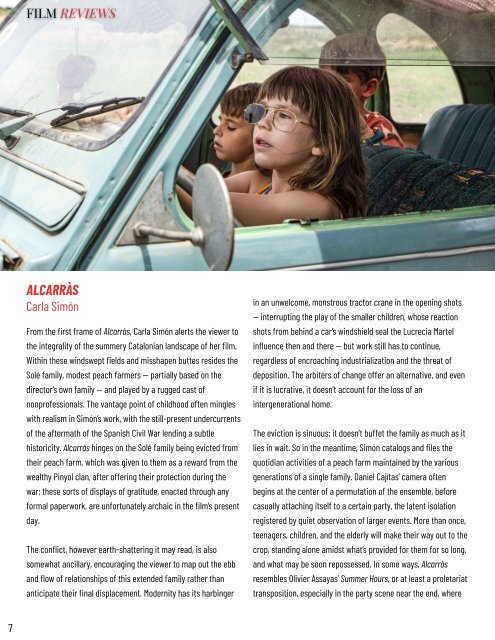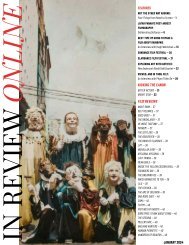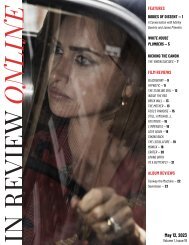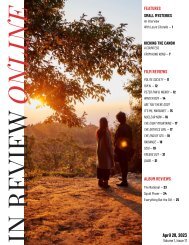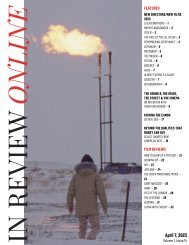InRO Weekly — Volume 1, Issue 1
Create successful ePaper yourself
Turn your PDF publications into a flip-book with our unique Google optimized e-Paper software.
FILM REVIEWS<br />
ALCARRÀS<br />
Carla Simón<br />
From the first frame of Alcarràs, Carla Simón alerts the viewer to<br />
the integrality of the summery Catalonian landscape of her film.<br />
Within these windswept fields and misshapen buttes resides the<br />
Solé family, modest peach farmers <strong>—</strong> partially based on the<br />
director’s own family <strong>—</strong> and played by a rugged cast of<br />
nonprofessionals. The vantage point of childhood often mingles<br />
with realism in Simón’s work, with the still-present undercurrents<br />
of the aftermath of the Spanish Civil War lending a subtle<br />
historicity. Alcarràs hinges on the Solé family being evicted from<br />
their peach farm, which was given to them as a reward from the<br />
wealthy Pinyol clan, after offering their protection during the<br />
war; these sorts of displays of gratitude, enacted through any<br />
formal paperwork, are unfortunately archaic in the film’s present<br />
day.<br />
The conflict, however earth-shattering it may read, is also<br />
somewhat ancillary, encouraging the viewer to map out the ebb<br />
and flow of relationships of this extended family rather than<br />
anticipate their final displacement. Modernity has its harbinger<br />
in an unwelcome, monstrous tractor crane in the opening shots<br />
<strong>—</strong> interrupting the play of the smaller children, whose reaction<br />
shots from behind a car’s windshield seal the Lucrecia Martel<br />
influence then and there <strong>—</strong> but work still has to continue,<br />
regardless of encroaching industrialization and the threat of<br />
deposition. The arbiters of change offer an alternative, and even<br />
if it is lucrative, it doesn’t account for the loss of an<br />
intergenerational home.<br />
The eviction is sinuous; it doesn’t buffet the family as much as it<br />
lies in wait. So in the meantime, Simón catalogs and files the<br />
quotidian activities of a peach farm maintained by the various<br />
generations of a single family. Daniel Cajítas’ camera often<br />
begins at the center of a permutation of the ensemble, before<br />
casually attaching itself to a certain party, the latent isolation<br />
registered by quiet observation of larger events. More than once,<br />
teenagers, children, and the elderly will make their way out to the<br />
crop, standing alone amidst what’s provided for them for so long,<br />
and what may be soon repossessed. In some ways, Alcarràs<br />
resembles Olivier Assayas’ Summer Hours, or at least a proletariat<br />
transposition, especially in the party scene near the end, where<br />
7


